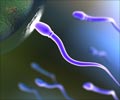
Fertility tests frequently reveal that males have problems with the quality of their sperm.
The problems often relate to sperm senescence, which is a reduction in quality with age. Sperm senescence can arise either before or after the DNA in the sperm cells is produced by a process known as meiosis.
So-called "pre-meiotic" senescence results from accumulated damage in the germline cells with increasing age and results in older males having sperm of lower quality.
Post-meiotic senescence occurs after the sperm cells have been produced, either during storage of sperm by the male or after ejaculation and before they fertilize the eggs.
There is previous evidence that various kinds of sperm senescence occur in insects, in some domestic animals - birds and mammals - and even in humans but the studies have generally been carried out under fairly artificial conditions and so it is not clear how they relate to wild animals - or to the general human population.
These objections have been overcome in the latest work of Attila Hettyey and colleagues at the Konrad Lorenz Institute of Ethology, University of Veterinary Medicine, Vienna (Vetmeduni), together with Balazs Vagi in Budapest, Hungary, where Hettyey himself is now working.
The researchers investigated the common toad, an interesting model system as it is known to produce all its sperm before the start of the breeding season.
They found that male toads that re-entered hibernation at the start of the breeding season, i.e. that lowered their metabolic rates after producing sperm, stored sperm of significantly higher motility than males kept under pseudo-natural conditions without females throughout the entire breeding season.
The result means that slowing the normal rate of general physiological processes reduced the normal rate of sperm ageing within the toad's testicles. This constitutes the first evidence for post-meiotic intra-testicular sperm senescence in a wild vertebrate.
A further surprising result was that in males kept under pseudo-natural conditions, sperm motility was related to the number of matings a male achieved, with the presence of females or the occurrence of matings having a positive effect on the quality of stored sperm.
This suggests that post-meiotic intra-testicular sperm senescence does not occur at a fixed rate but may be modulated by external factors, such as temperature and number of matings.
In summary, the scientists at the Vetmeduni have shown that sperm senescence occurs while sperm are stored in the testicles of animals living under essentially "natural" conditions.
They also suggest that the rate of sperm senescence can be slowed if males mate more frequently. For animals that produce sperm continuously, such as man, the implications seem to be that more frequent ejaculations serve both to remove older and thus less viable sperm as well as to reduce the damage to sperm cells during storage.
The study has been published in the international online journal PLoS ONE.
Source-ANI














